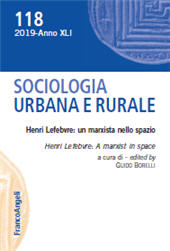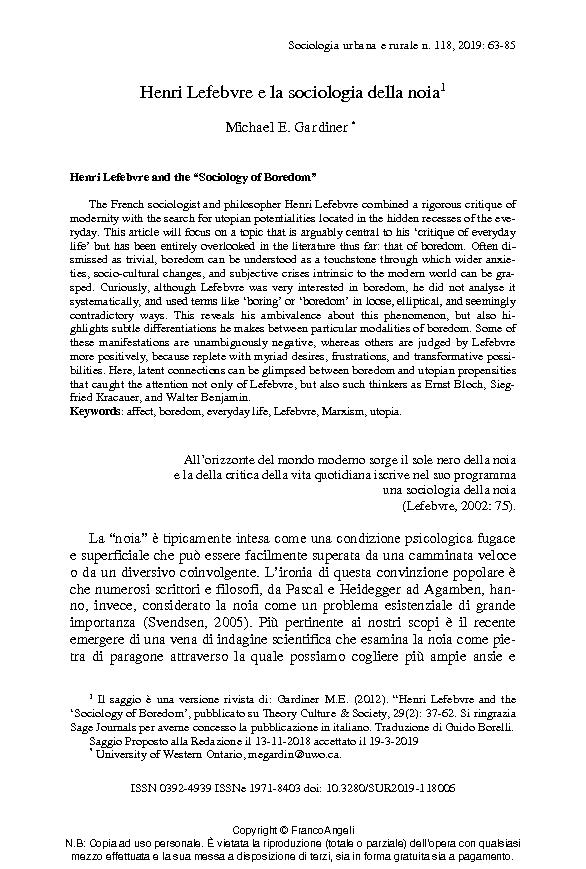2019 - Franco Angeli
Articolo
Versione Digitale
Download | Copia/incolla | Stampa
Henri Lefebvre e la sociologia della noia
63-85 p.
- The French sociologist and philosopher Henri Lefebvre combined a rigorous critique of modernity with the search for utopian potentialities located in the hidden recesses of the every-day. This article will focus on a topic that is arguably central to his 'critique of everyday life' but has been entirely overlooked in the literature thus far: that of boredom. Often dismissed as trivial, boredom can be understood as a touchstone through which wider anxieties, socio-cultural changes, and subjective crises intrinsic to the modern world can be grasped. Curiously, although Lefebvre was very interested in boredom, he did not analyse it systematically, and used terms like 'boring' or 'boredom' in loose, elliptical, and seemingly contradictory ways. This reveals his ambivalence about this phenomenon, but also highlights subtle differentiations he makes between particular modalities of Some of these manifestations are unambiguously negative, whereas others are judged by Lefebvre more positively,
- because replete with myriad desires, frustrations, and transformative possibilities. Here, latent connections can be glimpsed between boredom and utopian propensities that caught the attention not only of Lefebvre, but also such thinkers as Ernst Bloch, Siegfried Kracauer, and Walter Benjamin. [Publisher's text].
Fa parte di
Sociologia urbana e rurale : XLI, 118, 2019-
Informazioni
Codice DOI: 10.3280/SUR2019-118006
ISSN: 1971-8403
PAROLE CHIAVE
- Affect, boredom, everyday life, Lefebvre, Marxism, utopia
-
Nello stesso fascicolo
- Henri Lefebvre : un Marxista nello spazio : Ravi de vous revoir en Italie, M. Lefebvre
- Ricordo di Henri Lefebvre
- Henri Lefebvre e il diritto alla città : storia, teoria, politica
- La rivendicazione odierna del diritto alla città
- Sperimentare i limiti del possibile, Lefebvre e l'utopia
- Henri Lefebvre e la sociologia della noia
- Henri Lefebvre : la rivoluzione come festa
- Henri Lefebvre e la critica marxista dell'abitare
- Lo Stato, lo spazio e l'autogestione
- Un urlo e una domanda
- Il riuso creativo per uno sviluppo locale partecipato : i casi di Officine zero e dell'Officina delle idee nel Lazio
- Confini ibridi della smart city nel processo di urbanizzazione della tecnologia
- In cerca di casa
- Recensioni



